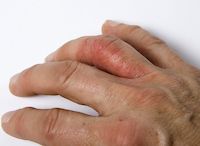Netakimab Rapidly Improves Axial Disease
The findings are based on data from a 24-week observation from an ongoing phase 3 PATERA study.

New research suggests for patients with psoriatic disease, netakimab leads to rapid and sustained improvement in axial disease.
The findings, presented at the European E-Congress of Rheumatology (EULAR 2020) due to the cancellation of the in-person meeting, highlighted the benefits of netakimab, which is a humanized anti-interleukin 17A antibody approved for the treatment of moderate-to-severe plaque psoriasis.
Tatiana Korotaeva, MD, PhD, from the Nasonova Research Institute of Rheumatology in Russia, and a team of Europe-based investigators evaluated the effects of the drug on axial symptoms in patients with psoriatic arthritis. The findings were based on data from a 24-week observation from an ongoing phase 3 PATERA study.
The PATERA study is international, double-blind, and placebo-controlled. The investigators screened 194 eligible patients who fulfilled the classification criteria for psoriatic arthritis. Patients had an inadequate response to conventional synthetic disease-modifying antirheumatic drugs (csDMARDs) or 1 tumor necrosis factor-inhibitor.
The team randomly assigned each patient 1:1 to either receive netakimab 120 mg or placebo at weeks 0, 1, 2, 4, 6, 8, 19, 14, 18, and 22. Among those in the placebo cohort, 84 patients failed to achieve ACR20—20% improvement based on the American College of Rheumatology criteria—by week 16, were switched to netakimab.
Korotaeva and the investigators evaluated a subset of patients with axial involvement—defined by presence of inflammatory back pain according to the Assessment of SpondyloArthritis international Society inflammatory back pain criteria. The team used spondylitis-specific assessments, including spinal pain (10-item numerical rating scale), nocturnal back pain (10-item numerical rating scale), Bath Ankylosing Spondylitis Disease Activity Index, and Ankylosing Spondylitis Disease Activity Score with C-reactive protein.
Overall, the investigative team included 104 patients with psoriatic arthritis who had inflammatory back pain (54 patients on netakimab; 50 patients received placebo) at baseline. Demographic and baseline disease characteristics were similar across both groups. The mean age in the netakimab group was 43.5 years old while the placebo arm was slightly younger, with a mean age of 42.7 years old. In the netakimab group, half of the patients were male, while 52% of those in the placebo group were male.
In patients treated with netakimab, the Bath Ankylosing Spondylitis Disease Activity Index and Ankylosing Spondylitis Disease Activity Score with C-reactive protein scores both decreased significantly. At week 24, the mean changes in the scores were -2.83 and -1.57 in the netakimab group for Bath Ankylosing Spondylitis Disease Activity Index and Ankylosing Spondylitis Disease Activity Score with C-reactive protein scores versus -.19 and -.11 in the placebo arm (P <.0001).
At baseline, about half of those randomized to the PATERA study had inflammatory back pain. Treatment with netakimab resulted in rapid and sustained improvement in axial disease in patients who had active psoriatic arthritis.
The study, “Efficacy of Netakimab in the Treatment of Axial Disease in Patients With Psoriatic Arthritis: Results of Subanalysis From a Double-Blind Randomized Phase 3 Trial (PATERA),” was published online on the EULAR 2020 website.